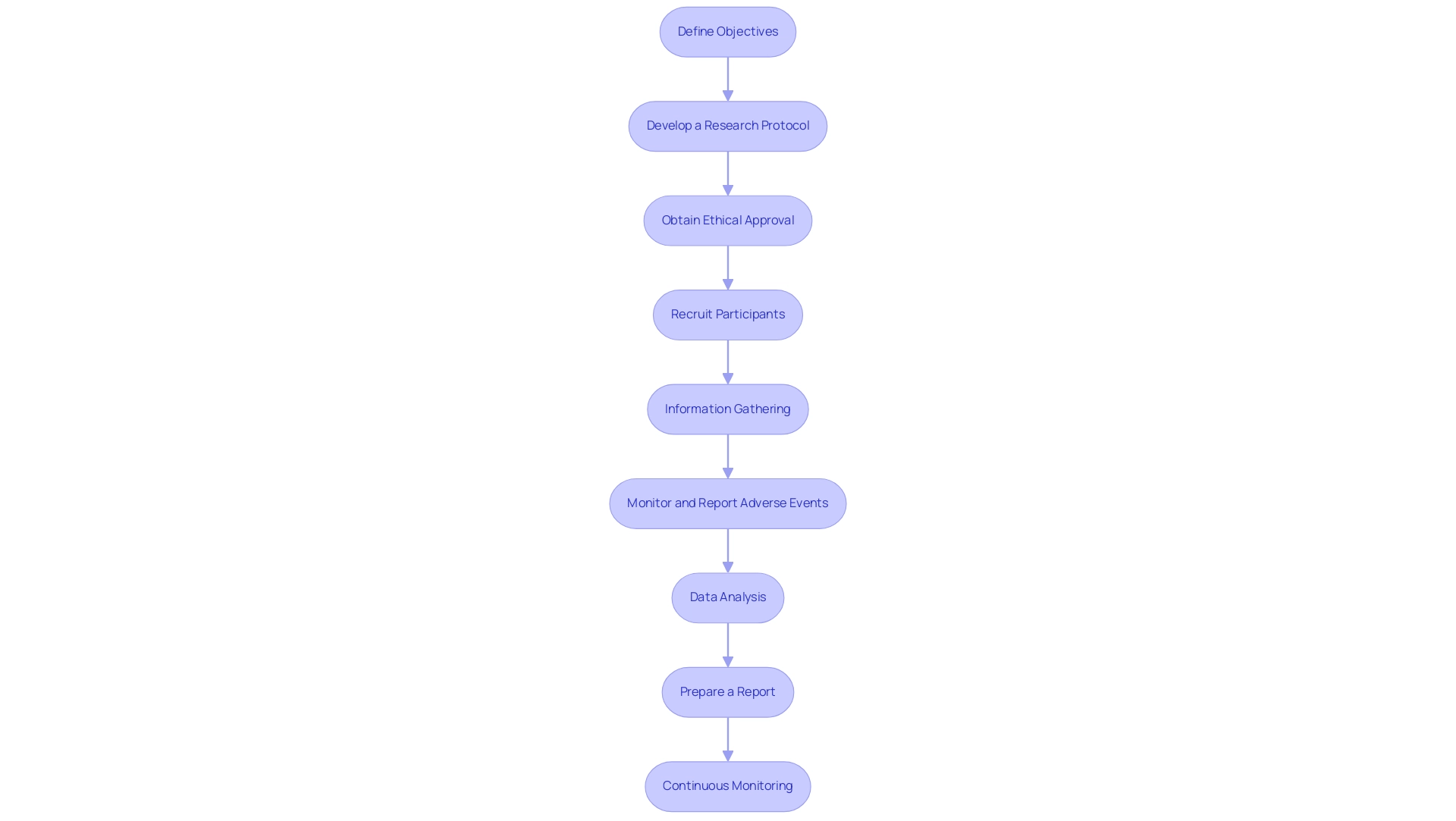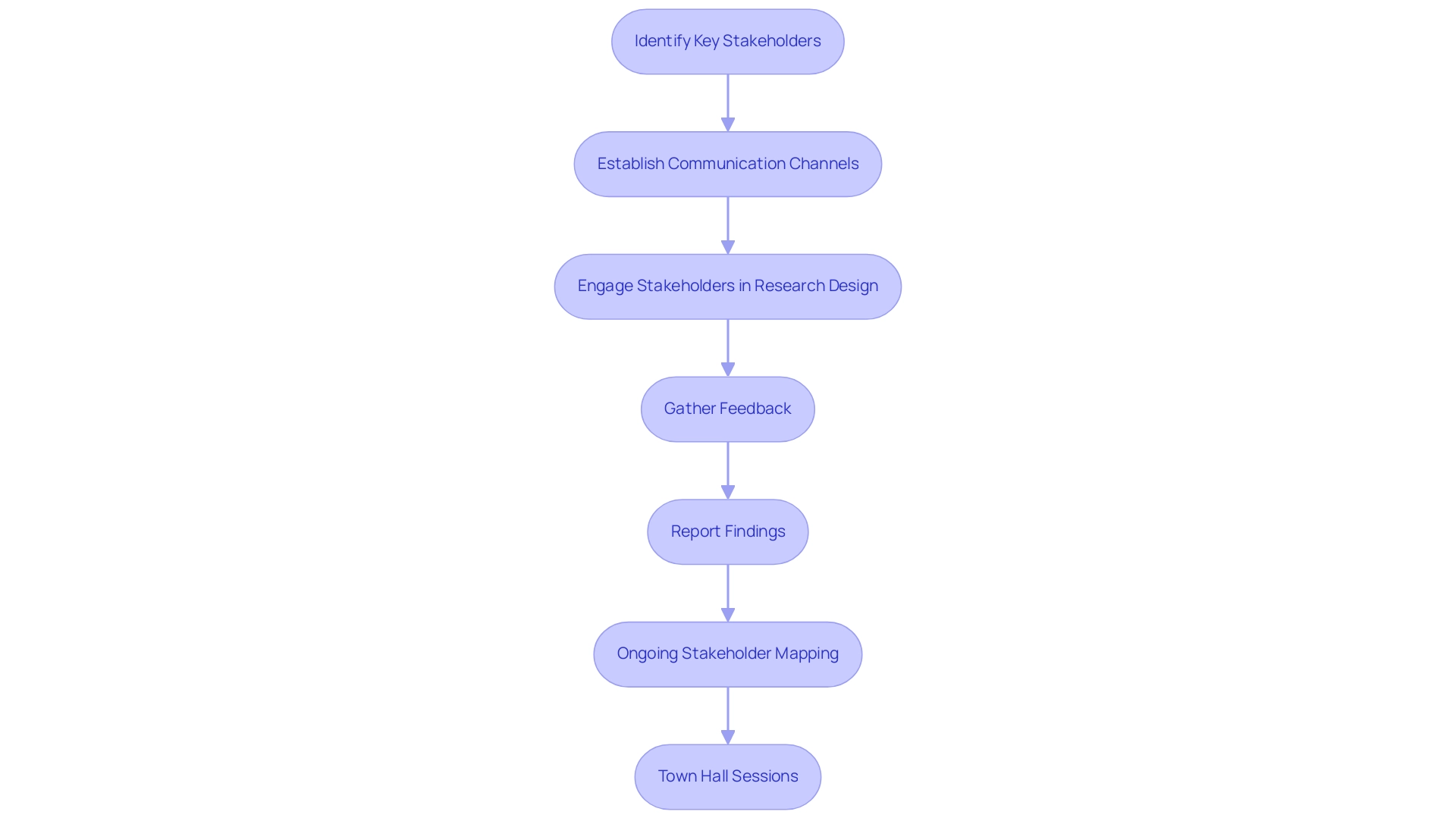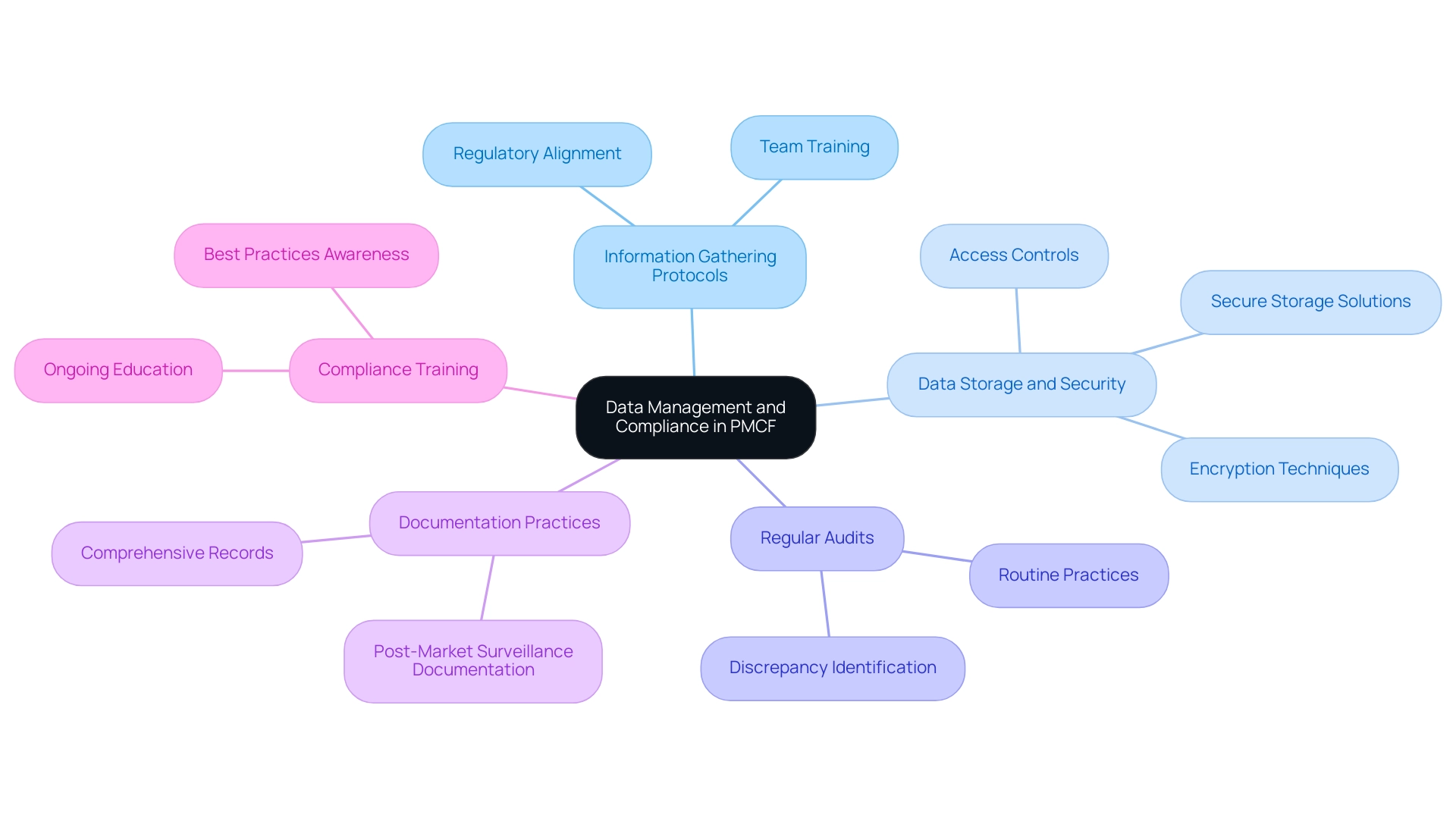Introduction
Navigating the complex landscape of Post-Market Clinical Follow-Up (PMCF) in Argentina requires a comprehensive understanding of the regulatory framework, ethical considerations, and effective stakeholder engagement. As the medical device industry evolves, so too must the strategies employed to ensure the safety and efficacy of products post-market.
The National Administration of Drugs, Foods and Medical Technology (ANMAT) plays a pivotal role in overseeing PMCF studies, mandating adherence to specific guidelines that safeguard participant welfare and data integrity.
This article delves into the essential components of conducting PMCF in Argentina:
- Establishing robust data management practices
- Engaging stakeholders effectively
Ultimately equipping researchers with the knowledge necessary to navigate this critical aspect of clinical research.
Understanding the Regulatory Framework for PMCF in Argentina
In Argentina, the National Administration of Drugs, Foods and Medical Technology (ANMAT) primarily manages the regulatory framework overseeing Post-Market Clinical Follow-Up Argentina (PMCF) research. A thorough understanding of the key regulations and guidelines is crucial for ensuring compliance. Notable points include:
- Regulatory Guidelines: Familiarity with ANMAT's specific Post-Market Clinical Follow-Up Argentina guidelines is imperative, as they delineate the requirements for ongoing monitoring of the safety and efficacy of medical devices post-market.
- Ethics Committees: Authorization from an ethics committee is a prerequisite for any Post-Market Clinical Follow-Up Argentina, ensuring the rights and welfare of participants involved in follow-up research are protected.
- Reporting Requirements: Awareness of the obligations related to the reporting of adverse events and significant findings during the Post-Market Clinical Follow-Up Argentina process is essential. Timely and accurate reporting is critical to maintaining compliance and ensuring patient safety.
- Documentation: Comprehensive documentation of all activities related to Post-Market Clinical Follow-Up Argentina is necessary, including study protocols, informed consent forms, and correspondence with oversight authorities. Such documentation is vital for audits and regulatory inspections.
- Stakeholder Engagement: Interacting with stakeholders—like healthcare professionals and patients—is essential for collecting insights and feedback that can improve the Post-Market Clinical Follow-Up Argentina process. bioaccess® provides various services to assist post-market clinical follow-up studies, including feasibility studies, site selection, compliance reviews, trial setup, and project management, ensuring that all aspects of the study are meticulously handled.
Considering the recent landmark reform bill (Ley Bases) introduced to Congress, intending to modernize and deregulate Argentina's economy, there may be implications for the oversight landscape concerning Post-Market Clinical Follow-Up Argentina. As Leonardo Madcur, Alternate Executive Director for Argentina, stated on June 13, 2024, 'The reforms will enhance transparency and governance, which are essential for fostering a robust clinical research landscape.' By thoroughly understanding these compliance aspects, researchers can skillfully navigate the complexities of Post-Market Clinical Follow-Up Argentina, ensuring that their practices are both effective and ethically sound.
Furthermore, considering the overall balance for provinces, notably -0.9% in 2015, -0.6% in 2019, and an estimated 0.0% in 2023, reflects the evolving economic landscape impacting clinical research operations. Katherine Ruiz, a specialist in regulatory matters for medical devices and in vitro diagnostics in Colombia, plays a vital role in assisting researchers with these regulatory challenges, utilizing her extensive experience and knowledge to ensure compliance and promote successful Post-Market Clinical Follow-Up Argentina.
Step-by-Step Process for Conducting Post-Market Clinical Follow-Up
To successfully conduct Post-Market Clinical Follow-Up (PMCF) studies in Argentina, it is essential to adhere to the following systematic steps, particularly in light of the recent findings regarding the manipulation of Argentinean inflation statistics from 2006 to 2015, which underscores the critical importance of data integrity in clinical research:
- Define Objectives: Clearly articulate the objectives of the PMCF research. Specify the safety and efficacy information you intend to gather and its relevance to ongoing product evaluation, keeping in mind the necessity for accurate information as highlighted by recent analyses.
- Develop a Research Protocol: Formulate a comprehensive research protocol that encompasses methodologies, participant selection criteria, data collection methods, and statistical analysis plans. Ensure that this protocol complies with the latest ANMAT guidelines.
- Obtain Ethical Approval: Submit your research protocol to an ethics committee for thorough review and approval. Address any concerns raised to guarantee the study adheres to established ethical standards. As noted by researchers in the field, obtaining ethical approval is critical for maintaining the integrity of the PMCF process. Maximiliano Miranda-Zanetti emphasizes, "Therefore we can claim that, indeed, inflation figures were tampered with in Argentina for an entire decade," highlighting the need for vigilance in maintaining integrity.
- Recruit Participants: Identify and recruit participants who satisfy the defined criteria. Ensure that informed consent is obtained from all participants prior to starting collection.
- Information Gathering: Execute the information collection process as delineated in your protocol. This may involve methods such as surveys, interviews, or clinical assessments to collect relevant information on the product's performance. Be aware of potential pitfalls in information integrity, as demonstrated by the case examination on Benford's law failure, which revealed that neither rounding nor splicing could clarify the failure of the INDEC series to satisfy Benford’s law.
- Monitor and Report Adverse Events: Vigilantly monitor participants for any adverse events, promptly reporting these incidents to ANMAT as required. Meticulous documentation of all findings is essential.
- Data Analysis: Analyze the collected data following the statistical methods outlined in your protocol. Interpret the results within the context of the product's safety and efficacy, ensuring that your analysis is robust and comprehensive.
- Prepare a Report: Compile the findings into a detailed report summarizing the study's objectives, methodologies, results, and conclusions. This report must be submitted to ANMAT and made accessible to relevant stakeholders.
- Continuous Monitoring: Acknowledge that post-market clinical follow-up is an ongoing endeavor. Continuously monitor the product's market performance and adjust your post-market clinical follow-up activities as necessary in response to new findings or regulatory updates.
By following these structured steps and emphasizing the importance of data integrity, while leveraging the expertise of bioaccess®—which boasts over 20 years of experience in Medtech and offers comprehensive services such as feasibility assessments, site selection, trial setup, and project management—you can ensure a compliant and effective approach to conducting Post-Market Clinical Follow-Up in Argentina, ultimately enhancing patient outcomes and ensuring product safety.

Engaging Stakeholders in the PMCF Process
Involving stakeholders throughout the Post-Market Clinical Follow-Up Argentina process is essential for obtaining a thorough understanding of a product's performance and safety. By utilizing the expertise and specialized knowledge of bioaccess®, which has over 20 years of experience in managing clinical studies—including Early-Feasibility Studies, First-In-Human, Pilot, Pivotal, and Post-Market Clinical Follow-up—effective strategies for stakeholder engagement can significantly enhance the quality of post-market activities. Key strategies include:
- Identify Key Stakeholders: Begin by identifying essential stakeholders, which encompass healthcare providers, patients, regulatory authorities like INVIMA, and industry partners. Understanding their roles and interests is foundational to effective engagement.
- Establish Communication Channels: Implement robust communication channels that facilitate consistent updates and feedback from stakeholders. Options may include regular meetings, newsletters, and dedicated online platforms, ensuring that all voices are heard throughout the process.
- Engage Stakeholders in Research Design: Actively engage key stakeholders in the design phase of the post-market clinical follow-up. By considering their insights and experiences, researchers can develop investigations that are not only relevant but also more likely to yield impactful results.
- Gather Feedback: Proactively seek input from stakeholders during and after the process. This feedback is invaluable, offering insights into the product's real-world performance and identifying potential areas for enhancement, which is vital for meeting the compliance standards set by INVIMA.
- Report Findings: Ensure that the outcomes of the research are shared with stakeholders, emphasizing how their contributions shaped the findings. This transparency fosters trust and encourages ongoing collaboration.
- Ongoing Stakeholder Mapping: Recognize that stakeholder mapping is an ongoing process that should be regularly reviewed and updated. This practice is essential for maintaining effective engagement and adapting to the evolving landscape of stakeholder interests and influences.
- Town Hall Sessions: Consider holding town hall sessions after strategic plans are revised or created. These sessions can foster alignment and involvement among key stakeholders, enabling open discussions and feedback on the post-market clinical follow-up process.
By effectively involving stakeholders, researchers can significantly enhance post-market clinical follow-up outcomes, ensuring that diverse perspectives are incorporated into the evaluation process. A case analysis on stakeholder mapping demonstrates this approach: organizations that classify stakeholders according to their interest and influence can optimize resource allocation and communication strategies, ultimately improving strategic planning and stakeholder engagement in project management and consulting frameworks. Additionally, the flexibility of bioaccess® in adapting to various research types further enhances its capability to manage these complex processes effectively.

Data Management and Compliance in PMCF
Efficient information management is crucial for the successful implementation of Post-Market Clinical Follow-Up Argentina (PMCF) research. Utilizing the knowledge of bioaccess®, which focuses on expedited clinical study services for medical devices throughout Latin America, guarantees adherence to best practices that not only meet compliance standards but also preserve the integrity of the information gathered. Here are essential strategies to implement:
-
Information Gathering Protocols: Establishing robust information gathering protocols is critical. These protocols should align with regulatory requirements and ethical guidelines, ensuring that all team members are thoroughly trained on them. Clear instructions facilitate consistent information gathering and minimize errors.
-
Data Storage and Security: The protection of sensitive participant information is a priority. Implementing secure information storage solutions—such as those provided by BioT—can significantly enhance security. Utilizing encryption techniques and stringent access controls will safeguard information against unauthorized access, aligning with compliance mandates under regulations like HIPAA and GDPR.
Utilizing a regulated cloud infrastructure can further streamline compliance with the Post-Market Clinical Follow-Up Argentina requirements, ensuring secure information storage and automated information collection.
-
Regular Audits: Conducting routine audits of information management practices is vital for identifying discrepancies and areas for enhancement. This proactive measure not only aids in maintaining compliance but also bolsters the overall integrity of the information, ensuring that any non-conformities are promptly addressed.
-
Documentation Practices: Accurate and comprehensive documentation of all information management activities is essential. This includes detailed records of data entry, updates, and any modifications to protocols. Manufacturers must document their post-market clinical follow-up activities as part of their post-market surveillance (PMS) obligations under the EU MDR.
Meticulous documentation is critical during inspections, as it demonstrates adherence to compliance requirements.
-
Compliance Training: Ongoing training for team members regarding compliance requirements and best practices is necessary to foster an informed workforce. By keeping the team informed on compliance standards, researchers can ensure alignment with adherence protocols, thus enhancing the credibility of their PMCF investigations.
Bioaccess® offers a comprehensive suite of services tailored to Post-Market Clinical Follow-Up Argentina investigations, which includes feasibility and selection of research locations, principal investigator selection, and meticulous project management. Their proven track record in successfully navigating regulatory landscapes ensures that clients meet all compliance requirements efficiently. As Jon Ingi Bergsteinsson, co-founder of Greenlight Guru Clinical, emphasizes,
Quality standards and compliance are foundational to effective information management practices in clinical studies.
Bioaccess®’s role in streamlining Post-Market Clinical Follow-Up Argentina and compliance demonstrates how these practices can be implemented effectively, facilitating secure data storage, automated reporting of adverse events, and comprehensive documentation. By prioritizing these best practices, researchers can not only meet regulatory obligations but also contribute to the reliability and safety of medical devices in the marketplace.

Evaluating and Reporting PMCF Outcomes
Following the conclusion of assessments related to Post-Market Clinical Follow-Up Argentina, a comprehensive evaluation of the results is essential for ensuring the continued safety and efficacy of medical devices. bioaccess®, with its 20+ years of expertise in managing clinical trials across Latin America, including Early-Feasibility Evaluations (EFS), First-In-Human Trials (FIH), Pilot Trials, and Pivotal Trials, provides the necessary support to navigate this process effectively. The following steps outline how to approach this critical evaluation:
- Examine Gathered Information: Start by thoroughly reviewing and analyzing the information collected during the post-market clinical follow-up. Look for emerging trends, significant patterns, and any critical findings that could influence the product's safety and efficacy.
- Prepare Evaluation Reports: Develop comprehensive evaluation reports that encapsulate the findings from the PMCF study. These reports should include detailed sections on methodology, results, discussions, and conclusions, facilitating a clear understanding of the data.
- Share Findings with Stakeholders: It is vital to distribute the evaluation reports to all relevant stakeholders, such as regulatory bodies, healthcare professionals, and internal teams. This practice fosters transparency and builds trust among all parties involved. As Roseann White, Co-Chair of the AdvaMed Statistical Working Group, emphasizes, "Effective communication of findings is crucial in maintaining the integrity of the evaluation process."
- Implement Recommendations: Based on the insights gleaned from the evaluation, take necessary actions to address any identified issues or enhance product performance. This may involve carrying out extra research, modifying the product, or offering further training for healthcare providers to ensure optimal use.
- Continuous Improvement: Utilize the insights acquired from post-market clinical follow-up outcomes to inform future research and development initiatives, promoting ongoing improvements in product safety and efficacy. Recent discussions at industry conferences, including those surrounding INVIMA's regulatory functions, have highlighted the importance of adhering to updated standards, as illustrated in the case analysis on 'Latest Standards Revisions and Guidance Documents in Analytical Research,' where experts from Illumina and the FDA discussed the applicability of these standards to emerging technologies.
By diligently evaluating and reporting outcomes from the Post-Market Clinical Follow-Up Argentina, researchers play a crucial role in the continuous assessment of medical devices, ensuring that they adhere to the highest standards of safety and effectiveness. Recent findings from PMCF research underscore the importance of these practices, with statistical evaluations anticipated to enhance reporting practices significantly in 2024. Engaging discussions, such as those held during the latest industry conference, have emphasized the evolving standards and guidance documents in analytical studies, setting a clear path for future evaluations.
To date, bioaccess® has overseen 100+ regulatory submissions, 75+ active clinical research sites, and 50+ medical device clinical trials across 8 therapeutic areas in 6 countries in Latin America, reflecting its commitment to excellence in clinical research.
Conclusion
Navigating the complexities of Post-Market Clinical Follow-Up (PMCF) in Argentina necessitates a thorough understanding of the regulatory framework, ethical standards, and effective stakeholder engagement. The National Administration of Drugs, Foods and Medical Technology (ANMAT) plays a critical role in ensuring that PMCF studies adhere to established guidelines, which are vital for safeguarding participant welfare and maintaining data integrity.
Key components of conducting PMCF include:
- The establishment of robust data management practices
- The systematic approach to stakeholder engagement
- The meticulous execution of study protocols
Each step, from defining objectives to continuous monitoring, is essential for gathering meaningful data that reflects the safety and efficacy of medical devices in real-world settings. Moreover, the importance of data integrity cannot be overstated, especially in light of recent findings regarding statistical manipulations in Argentina.
Effective stakeholder engagement enhances the PMCF process by incorporating diverse perspectives, which ultimately leads to improved outcomes. By fostering transparent communication and collaboration with healthcare providers, patients, and regulatory authorities, researchers can create studies that are not only compliant but also relevant and impactful.
In summary, the successful execution of PMCF in Argentina hinges on:
- A comprehensive understanding of regulations
- A commitment to ethical practices
- Proactive stakeholder involvement
As the medical device landscape continues to evolve, embracing these principles will ensure the ongoing safety and efficacy of products, ultimately benefiting both the industry and the patients it serves.
Frequently Asked Questions
What is the role of ANMAT in Post-Market Clinical Follow-Up (PMCF) research in Argentina?
The National Administration of Drugs, Foods and Medical Technology (ANMAT) manages the regulatory framework for PMCF research in Argentina, ensuring compliance with specific guidelines for ongoing monitoring of medical devices' safety and efficacy.
Why is it important to have ethics committee authorization for PMCF studies?
Authorization from an ethics committee is required to protect the rights and welfare of participants involved in PMCF research, ensuring that ethical standards are maintained throughout the study.
What are the reporting requirements during PMCF?
Researchers must be aware of their obligations to report adverse events and significant findings promptly during the PMCF process, as timely and accurate reporting is critical for compliance and patient safety.
What kind of documentation is necessary for PMCF studies?
Comprehensive documentation is essential, including study protocols, informed consent forms, and correspondence with oversight authorities, which are vital for audits and regulatory inspections.
How can stakeholder engagement improve PMCF outcomes?
Engaging stakeholders, such as healthcare professionals and patients, allows for the collection of insights and feedback that can enhance the PMCF process, leading to more effective evaluations of medical devices.
What steps should be followed to conduct PMCF studies successfully?
The steps include defining objectives, developing a research protocol, obtaining ethical approval, recruiting participants, gathering information, monitoring adverse events, analyzing data, preparing a report, and continuous monitoring of product performance.
What is the significance of data integrity in PMCF research?
Maintaining data integrity is crucial for ensuring the accuracy of findings and adherence to compliance standards, especially in light of past issues regarding the manipulation of inflation statistics in Argentina.
What strategies can be implemented for effective information management in PMCF?
Essential strategies include establishing information gathering protocols, ensuring data storage and security, conducting regular audits, maintaining thorough documentation, and providing compliance training for team members.
What should be done after completing PMCF assessments?
Researchers should evaluate the gathered information, prepare evaluation reports, share findings with stakeholders, implement recommendations based on insights, and promote continuous improvement in product safety and efficacy.
How does bioaccess® support PMCF research in Argentina?
Bioaccess® offers comprehensive services, including feasibility studies, site selection, compliance reviews, trial setup, and project management, leveraging over 20 years of experience to ensure compliance and effective PMCF processes.




